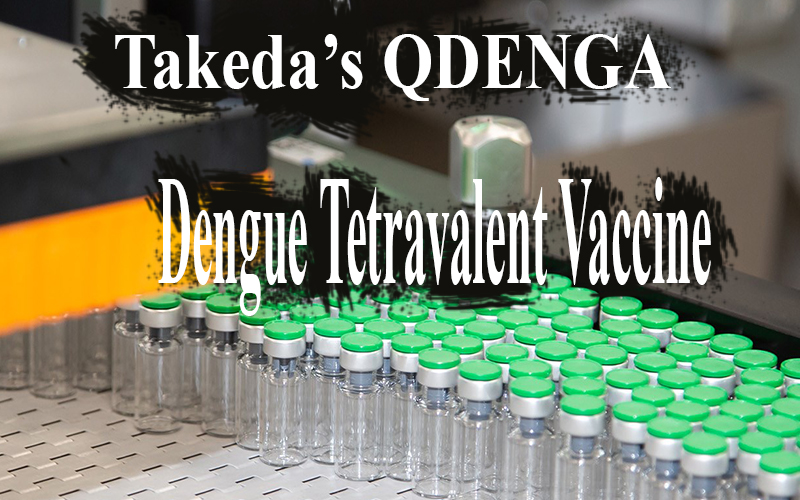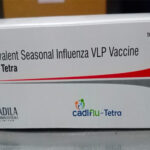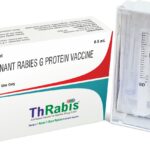Takeda’s QDENGA Dengue Tetravalent Vaccine has been approved for use in European Union
− The European Commission Approved QDENGA (TAK-003) for Use in Individuals Four Years of Age and Older
− QDENGA Becomes the Only Dengue Vaccine Approved in the EU for Use in Individuals Regardless of Previous Dengue Exposure
Mumbai, December 10, 2022 – Takeda has announced that the European Commission (EC) granted marketing authorization for the company’s dengue vaccine QDENGA® (Dengue Tetravalent Vaccine for the prevention of dengue disease in individuals from four years of age in the European Union (EU). QDENGA should be used in accordance with official recommendations. The approval follows the positive recommendation from the European Medicines Agency’s Committee for Medicinal Products for Human Use (CHMP) in October 2022.


“With the increasing ease of travel today, our once expansive world has become that much smaller, increasing the risk of dengue disease for those living in dengue-endemic areas and for those traveling to these regions,” said Gary Dubin, M.D., president of the Global Vaccine Business Unit at Takeda. “The European Commission’s approval marks an important turning point for QDENGA as we are one step closer to achieving our aspiration to help reduce the global burden of dengue. We are proud to introduce QDENGA in many parts of the EU, offering healthcare providers a new tool in dengue prevention for their patients living in the EU and traveling to endemic regions around the world.”
The worldwide incidence of dengue has risen eight-fold in the past 20 years, and it continues to rise, fueled by climate change and urbanization. Today, dengue threatens about half the world’s population with a risk of infection in over 125 countries, and the disease is endemic in most of the European overseas countries, territories and departments located in tropical areas. These factors have led to events of local transmission in non-endemic areas in continental Europe, including France, Italy, Germany and Spain. Dengue is a leading cause of fever in travelers returning to Europe from endemic countries, and the incidence of dengue among European travelers is generally underestimated. The threat of disease is present for more than 26 million people from Europe who typically travel to endemic regions each year for holidays and visiting friends and family.
“Effective dengue prevention requires a multi-faceted approach, and previous methods have been insufficient for a number of reasons. With the potential for dengue to cause local outbreaks as demonstrated in several European countries over recent years, and the threat for European travelers visiting dengue-endemic countries, gaps exist that may put some people at risk,” said Dr. Tomas Jelinek, Medical Director of the Berlin Centre for Travel and Tropical Medicine and Scientific Director of the CRM Centrum für Reisemedizin Dusseldorf. “As a clinician, it is encouraging to have a new dengue vaccination tool available for a broad population of my patients.”
Approval from the EC was supported by results across 19 Phase 1, 2 and 3 trials with more than 28,000 children and adults, including four and a half years of follow-up data from the global, pivotal Phase 3 Tetravalent Immunization against Dengue Efficacy Study (TIDES) trial. The TIDES trial met its primary endpoint of overall vaccine efficacy (VE) by preventing 80.2% of symptomatic dengue cases 12 months after vaccination. In addition, TAK-003 met its key secondary endpoint by preventing 90.4% of hospitalizations 18 months after vaccination. Efficacy varied by serotype (DENV-1 – 4). The TIDES exploratory analyses showed that throughout the 4.5-year study follow-up, TAK-003 prevented 84% of hospitalized dengue cases and 61% of symptomatic dengue cases in the overall population, including both seropositive and seronegative individuals. TAK-003 has been generally well tolerated, with no evidence of disease enhancement in vaccine recipients, and no important safety risks have been identified, to date.
QDENGA is also approved in Indonesia for the prevention of dengue disease by any serotype in individuals six years to 45 years of age. Takeda continues to progress regulatory filings in other dengue-endemic countries in Asia and Latin America. The EC decision has no impact on the full year consolidated reported forecast for the fiscal year ending March 31, 2023 (Fiscal Year 2022).













